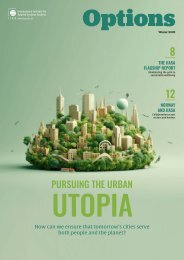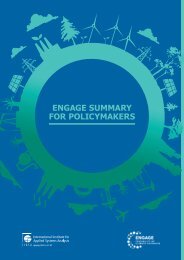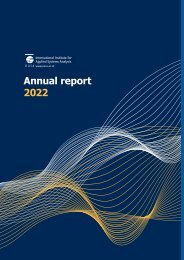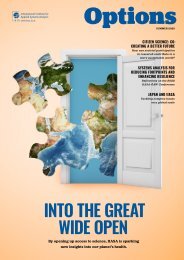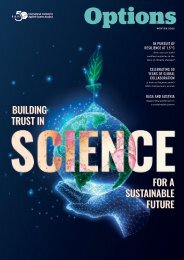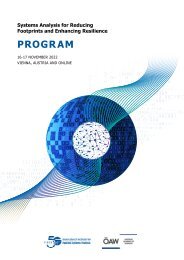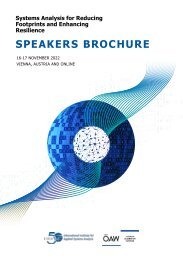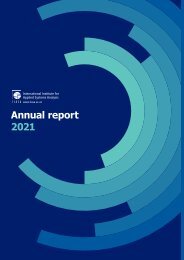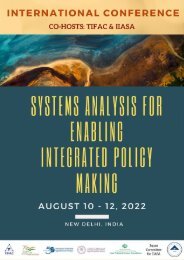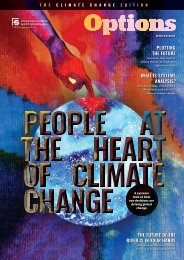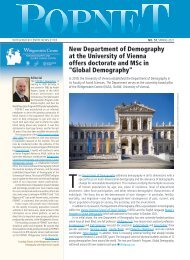Options Magazine, Summer 2022
Create successful ePaper yourself
Turn your PDF publications into a flip-book with our unique Google optimized e-Paper software.
© Nicoleta Raluca Tudor | Dreamstime<br />
Regional<br />
impacts<br />
Combatting marine litter<br />
through better data collection<br />
One of the most significant problems facing mankind is<br />
in our oceans. Marine litter, particularly plastics, harms<br />
more than just the ocean ecosystem—it can trap or<br />
kill sea and land animals and break down into smaller<br />
pieces that eventually end up in human food sources.<br />
Yet, the real extent of the problem is currently<br />
unknown due to the vastness of the oceans and the<br />
extensive circulation of plastic litter, which makes<br />
the research on marine litter and its impact on the<br />
environment challenging and prohibitively expensive.<br />
A recent project led by IIASA researcher Dilek Fraisl,<br />
aims to bridge the gap between volunteer-led local<br />
data collection and official monitoring and reporting<br />
processes to combat this problem. The project is based<br />
on an IIASA-led study on mapping citizen science<br />
contributions to the UN Sustainable Development<br />
Goals (SDGs).<br />
“In our Citizen Science for the SDGs project we<br />
collaborated with the Ghana Statistical Service, Ghana<br />
Environmental Protection Agency, the United Nations<br />
Environment Programme (UNEP), and other partners.<br />
We used citizen science data to address the data gap<br />
on marine plastics, which fed into Ghana’s official<br />
SDG monitoring and reporting efforts on a national<br />
scale, and UNEP globally,” explains Fraisl. “Thanks to<br />
our project, Ghana has become the first country to<br />
officially report on SDG indicator 14.1.1b on marine litter<br />
using citizen science data. Our results will also inform<br />
the formulation of an Integrated Coastal and Marine<br />
Management Policy in Ghana.”<br />
By Jeremy <strong>Summer</strong>s<br />
Further info: pure.iiasa.ac.at/17774 | pure.iiasa.ac.at/16543<br />
Dilek Fraisl: fraisl@iiasa.ac.at<br />
Local politics and<br />
global visions of<br />
Morocco’s renewable<br />
energy transition<br />
AFRICA<br />
As more countries in the Global South<br />
begin to transition towards green<br />
energy, there has been a noticeable<br />
and alarming trend in associated projects.<br />
These projects are situated within a spectrum<br />
of expectations that range from autocratic megaprojects<br />
that hurt local communities on the one hand;<br />
and promissory projects that foster sustainability and<br />
inclusivity on the other.<br />
Morocco is embarking on an ambitious green energy<br />
transition and is planning to construct 20 concentrated<br />
solar power plants as part of a national strategy known<br />
as the Solar Plan, which aims to not only provide<br />
energy security, but also to set the kingdom up for<br />
green energy export.<br />
IIASA researchers looked at Morocco’s Solar<br />
Plan and the dynamics set in motion on affected<br />
local communities. Research from Tata, a rural<br />
Moroccan community where a concentrated solar<br />
power plant is being built, indicates that there is<br />
still a top-down approach to these large projects<br />
with much of the policy field being dominated by<br />
national considerations, the interests of national<br />
elites, and international investors, not leaving much<br />
space for inclusiveness and the involvement of local<br />
communities.<br />
On the other hand, the researchers noted that<br />
just the announcement of concentrated solar power<br />
projects in an area gave rise to a chain of societal and<br />
political dynamics that create opportunities for local<br />
stakeholders to enter negotiations regarding the<br />
benefits for their local communities.<br />
By Neema Tavakolian<br />
Further info: pure.iiasa.ac.at/17737<br />
Nadejda Komendantova: komendan@iiasa.ac.at<br />
© Alexey Novikov | Dreamstime © Sjankauskas | Dreamstime<br />
22 <strong>Options</strong> <strong>Summer</strong> <strong>2022</strong><br />
www.iiasa.ac.at


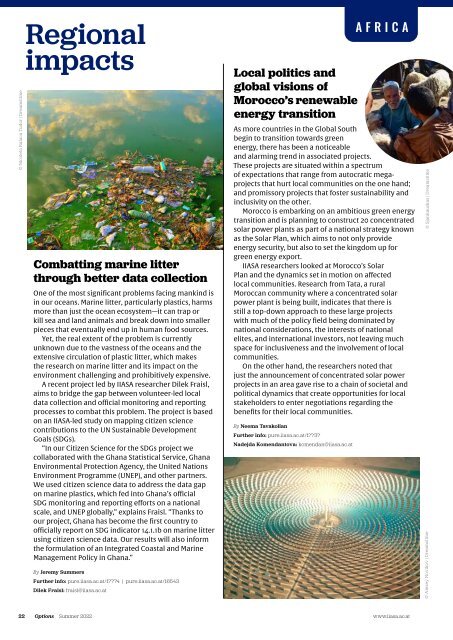

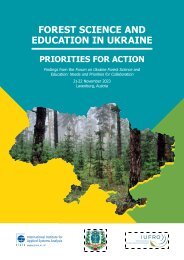
![IIASA BROCHURE_210x594[FINAL] WEB](https://documents.yumpu.com/000/068/591/122/1d4a7749a60d45b83ea15d6d660d0c8b3babc996/30524b562f4966364c7772585a337a5a4b454a3652513d3d/763264657868393835667437685130682f76554f79513d3d.jpg?AWSAccessKeyId=AKIAICNEWSPSEKTJ5M3Q&Expires=1715148000&Signature=W73jWyyLnGbKUGNI7MqcdlBZ2GQ%3D)
